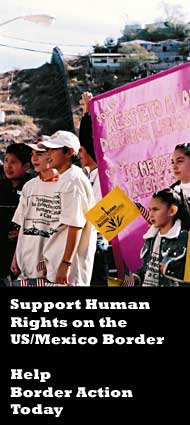This is no minor condemnation. To our everlasting shame, it puts the United States of America in the spotlight for yet another constellation of crimes against humanity during the God-forsaken reign of US Republican President George W. Bush.
The UN's High Commission on Human Rights is one of the world's leading advocates for common decency. That office investigates and reports on the full range of alleged atrocities worldwide. The office has reported recently on issues of women and violence, torture and detention in Romania, Abu Ghraib, Guantanamo, and torture and detentions in Tibet, among other global atrocities.
Note that the Special Rapporteur was denied access to two of the most controversial of our most notorious red, white, and blue for-profit human rights violators: Hutto in Texas, and Monmouth, in New Jersey.
This from the National Immigrant Justice Center:
U.N. Special Rapporteur Denounces U.S. Immigrant Detention System, Friday, 07 March 2008
The National Immigrant Justice Center applauds the recommendations released March 7 by the U.N. Special Rapporteur on the Rights of Migrants that call for sweeping reforms to restore justice and humanity to the U.S. immigration system.
In his report, Special Rapporteur Jorge Bustamante found that the U.S. immigrant detention and deportation system denies migrants basic due process and human rights, and violates international law. [Emphasis added.]
The report calls for significant reforms in the detention system, including the end of mandatory detention. [Emphasis added.]
The Special Rapporteur's report is the result of a three-week fact-finding mission he conducted in 2007. While he was invited to conduct the mission by the U.S. government, he was subsequently denied access to two detention centers without, in his words, satisfactory explanation.
The Special Rapporteur's recommendations include:Eliminate mandatory detention laws and require the Department of Homeland Security to evaluate on a case-by-case basis whether a non-citizen is a threat to society or a flight risk to justify detention.
Comply with two Supreme Court decisions, Zadvydas v. Davis and Clark v. Martinez, which state that individuals who cannot be returned to their home countries must not be detained longer than six months after their case is completed.
Implement effective alternatives to reduce the U.S. government's overuse of immigrant detention, which the Special Rapporteur found to be in violation of several international human rights laws.
Create legally binding human rights standards to govern the treatment of immigrant detainees.
Guarantee detained immigrants the right to appointed counsel.
Detain immigrants only in facilities that are located within easy reach of legal service providers and pro bono counsel.
Guarantee a day in court to all non-citizens who are subject to detention.
Provide judicial review of immigrants' custody so that custody decisions are not made by government officials but by immigration judges.
Consider the gender-specific needs of detained immigrant women who have suffered violence or are pregnant or nursing.
Visit the National Immigrant Justice Center's site to download a copy of the Special Rapporteur's report.
Or go here to visit the Texas Civil Rights Review's site and its coverage of the report.
Read the ACLU's oral statement responding to the Special Rapporteur's report, made before the U.N. Human Rights Commission and endorsed by the National Immigrant Justice Center.
Read briefing papers on immigrant detention submitted by NIJC and other non-governmental organizations to the Special Rapporteur prior to his visit.
An excerpt from the Report points at other violations of human rights involving immigrants in the USA:
While noting the Government’s interest in addressing some of the problems related to the human rights of migrants, the Special Rapporteur has serious concerns about the situation of migrants in the country, especially in the context of specific aspects of deportation and detention policies, and with regard to specific groups such as migrant workers in New Orleans and the Gulf Coast in the aftermath of Hurricane Katrina, migrant farm workers, and migrants in detention facilities. [Emphasis added.]



















0 comments:
Post a Comment